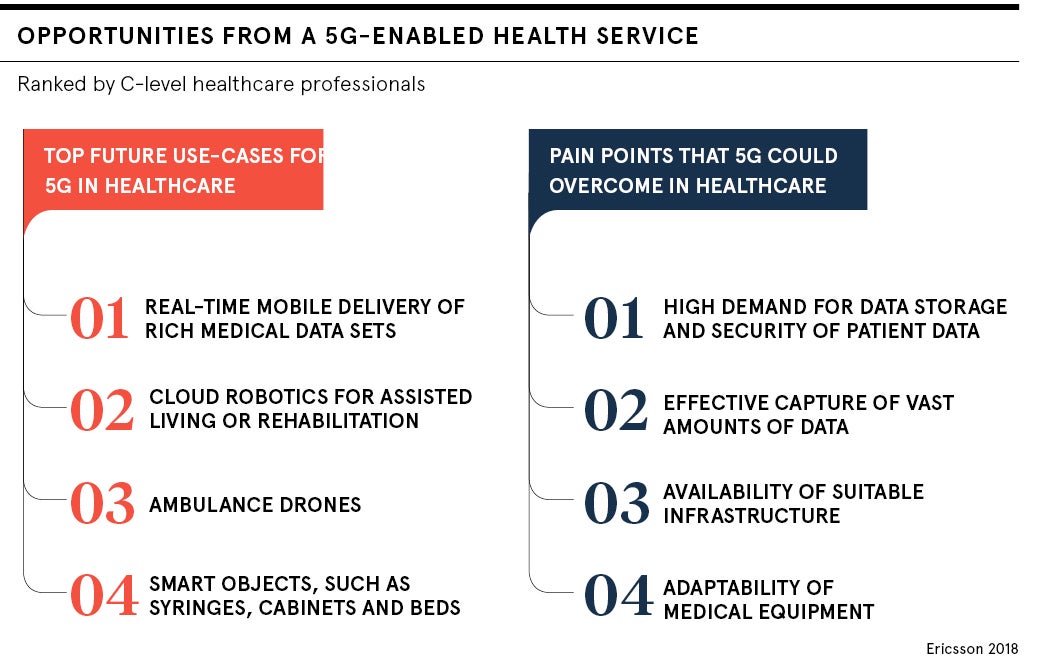5G is set to revolutionise healthcare. At this year’s Mobile World Congress in Barcelona, a gastrointestinal intervention was streamed live via 5G from an operating theatre at the Barcelona Hospital Clínic, with a surgeon overseeing the procedure in real time from the congress venue.
Amazing stuff. But the biggest bonus in the UK could come from filling the widening gaps in healthcare coverage.
Ambulances will be able to share critical patient data with A&E staff in real time while en route to the hospital
“An NHS app will be the entry point for all patients and it will mean the journey from GP to a specialist, to diagnosis then treatment could happen from your phone,” explains Alan Lowe, chief executive and co-founder at Visionable, which currently provides the NHS with a video collaboration platform for healthcare and advanced clinical needs.
“In Anglia, there are not enough stroke consultants so there isn’t always one on duty at A&E. You could link to a doctor at home or to a recently retired consultant. But for rural areas without broadband that’s difficult; 5G would solve that.”
How 5G’s reduced latency can improve patient trust
Iain Hennessey, consultant paediatric surgeon and director of innovation at Liverpool’s Alder Hey Children’s Hospital, a centre of excellence for children throughout the UK, believes 5G will dramatically change hospital-patient contact.
“5G will drive the consumer internet of things and the quantified self, which means people will come to hospital saying, ‘My fridge is linked to my diet tracker and to my food shopping; why do I need a paper diary on diabetes when I come into hospital?’” he says.
“If you look at current telemedicine solutions, we’re not quite there. Latency and quality of image is a problem. Trust is key; latency in a call can look like you’re taking too long to answer and you come across as shifty. Our neurology guys look for micro ticks in patients’ faces, which are crucial in monitoring people’s condition. Once the signal goes down below a certain level you lose the detail.
“We get kids transferred from North Wales, Isle of Man, Barrow-in-Furness, from all across the country. Some clinical appointments only take five minutes, so mum or dad has to take the day off work and come all the way for a quick chat. 5G will solve that problem.”
How 5G can help patients in remote locations
The benefits of 5G are likely to be felt most in rural areas, assuming coverage is ubiquitous, which is not the case with 4G or even high-speed broadband. Long, rural ambulance journeys to A&E could be transformed. “In a 5G-enabled ambulance, paramedics will be able to share critical patient data with A&E staff in real time while en route to the hospital, speeding up the triage process. And high-quality video streaming will enable A&E staff to begin diagnosis as early as possible,” explains Anne Sheehan, director at Vodafone Business.
Greig Paul at the University of Strathclyde, who is co-ordinating 5G RuralFirst’s trails of the technology in Shropshire, Somerset and the Orkney Islands, says: “Mobile coverage in Orkney is very patchy, which means, for instance, that fall alarms [for the elderly] are not an option. With the UK’s ageing population in outlying regions that’s a real problem. The trials are overcoming that and we’re connecting an NHS clinic in the north of the Orkney Islands that previously had no coverage.”
Sharing could overcome many coverage problems. A recent Ofcom consultation discussed sharing of the 5G spectrum more broadly, beyond those who own the licences. Dr Paul believes this would help make the business case for ubiquitous national coverage if providers had additional revenue streams from other companies.
Will the NHS adopt this technology in time?
Perhaps the biggest barrier to the nationwide adoption of 5G in the UK is the uneven and often anachronistic adoption of technology by an underfunded NHS, in places still reliant on fax machines and paper documents.
Visionable’s Mr Lowe, meanwhile, is working on connected ambulances for rural areas which carry multiple SIM cards enabling the ambulance to switch between providers with the strongest signal.
So, for the stretched NHS, 5G could offer a literally life-saving series of solutions. The question is will this be the one time the government gets the technology implementation right?
How 5G's reduced latency can improve patient trust


